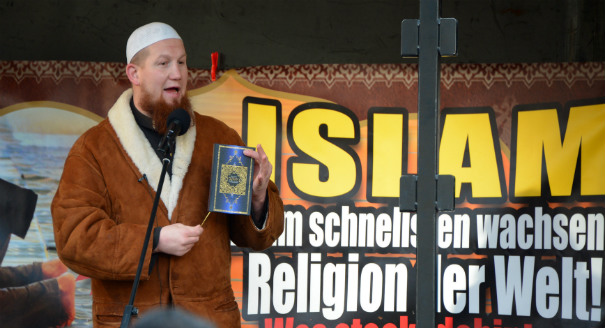As a way to promote a “moderate Islam” and improve Saudi Arabia’s image in Germany and in the West more broadly, in July 2017 Riyadh closed down the King Fahd Academy in Bonn. At the same time, it also halted construction on a nearly completed second campus for the academy in Berlin. The German media had repeatedly accused the academy, which was teaching 150 K-12 students using the Saudi curriculum, of feeding extremism among youth by encouraging jihad against non-Muslims. Despite such efforts, Saudi Arabia’s role as a supporter of Salafi groups, who are accused of inspiring and influencing hundreds of jihadis in Germany, is driving a greater wedge between the two partners.
In order to prevent Shia expansionism, since the Iranian Revolution Saudi Arabia has pushed a hardline Wahhabi model of religiosity, whether in the Islamic world or among Muslim minorities in the West. In Germany, Saudi support during the 1980s and 1990s—financial contributions but also, more importantly, religious guidance—was vital in giving Salafis a foothold. Saudi money paid for translations of Salafi literature from Arabic into German in order to spread Wahhabi ideology among Muslims.1
In recent years, the German government has openly expressed its anger at Saudi support for Salafis. In December 2015, Sigmar Gabriel, at the time the minister of economic affairs and energy as well as vice-chancellor, called on Saudi Arabia to stop funding Wahhabi mosques in the West, alleging that “many Islamists who are a threat to public safety come from these communities.” In 2016, the German media ran a leaked intelligence report that provided evidence of Saudi, Qatari, and Kuwaiti support for Salafis in Germany by constructing mosques and schools, as well as sending preachers.
The German intelligence agencies are not under the impression that all Salafis are extremists. Nonetheless, they do see an organic relationship between Salafis and youth extremism, as Salafis create a nurturing environment for the growth of extremist, jihadi ideology. A 2014 intelligence study on the backgrounds of Islamist jihadis who left Germany to fight in Syria and Iraq showed that, of the 323 people in the study whose ideology was known, 319 explicitly identified as Salafi. As part of their efforts to stop the spread of extremism among youth, German security agencies have followed a zero-tolerance policy with regard to violent Salafi activists, especially since a growing number of German jihadis headed for battlefronts in Iraq and Syria. The government tried and imprisoned dozens with proven ties to terrorist groups, while also launching several preventive initiatives to fight extremism, such as the HAYAT program and the Violence Prevention Network.
Germany has also seen several terrorist attacks in recent years, the deadliest being a truck attack by Anis Amri, a Tunisian asylum seeker believed to have been recruited by a Salafi mosque in Berlin, who killed twelve people at a Christmas market in December 2016. German Salafis are also a key component of jihadi movements in the Middle East. According to data from Germany’s domestic intelligence agency (BfV), the number of German residents who traveled to fight in Syria and Iraq rose steadily over the past five years, from 170 in September 2013 to 870 in September 2016 and 1,000 in September 2018.
Assumed Saudi support for Salafi groups among marginalized communities has affected Saudi–German relations, which are already at a crossroads and at serious risk of further escalation. After Sigmar Gabriel commented in November 2017 that Saudi Arabia was meddling in Lebanon’s political affairs, Saudi Arabia recalled its ambassador to Germany—only reestablishing a diplomatic presence ten months later, in September 2018. Furthermore, German intelligence views the kingdom as a potential threat both for its role in spreading Salafi ideology and for its lackluster conduct in cracking down on Salafi financing networks. German politicians are also launching unprecedented criticism against Saudi policies, particularly regarding human rights in the kingdom, the investigation into the murder of Saudi journalist Jamal Khashoggi, and the destructive Saudi-led war in Yemen, which has precipitated a massive humanitarian crisis. These topics will continue generating tension in the Berlin-Riyadh relationship.
However, so far both sides have prioritized their bilateral economic ties. Germany needs the major investment and export opportunities available in Saudi Arabia. As political tensions have grown, German exports to the kingdom declined from 10 billion euros ($11.4 billion) in 2015 to 6.6 billion euros ($7.6 billion) in 2017. Meanwhile, Saudi Arabia needs German business acumen to help pull off its 2030 development plan. More than 800 German companies are currently operating in Saudi Arabia, including on the massive new city of Neom, which is expected to a hub for biotechnology, energy, and water technology—for which German companies are a vital partner.
To salvage their economic relationship, Riyadh and Berlin will likely seek to strengthen their cooperation to contain the Salafis and prevent radicalization among young Muslims in Germany. Although both sides agreed to smooth over their relationship in September 2018, further security concerns such as a new terrorist attack could easily reignite these latent tensions.
* This article was translated from Arabic.
Mahmoud Jaraba is a post-doctoral fellow at the Max Plank Institute for Social Anthropology in Germany. Follow him on Twitter @MahmoudJaraba.
1. Authors’ interviews with Salafi activists and imams between 2015 and 2018, Germany.



.jpg)


